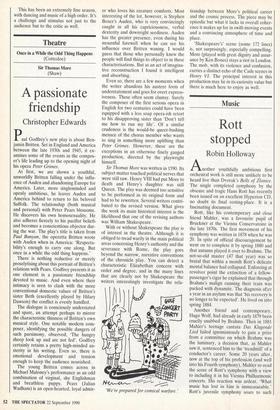Theatre
Once in a While the Odd Thing Happens (Cottesloe) Sir Thomas More (Shaw)
A passionate friendship
Christopher Edwards
Paul Godfrey's new play is about Ben- jamin Britten. Set in England and America between the late 1930s and 1945, it ex- amines some of the events in the compos- er's life leading up to the opening night of his opera Peter Grimes.
At first, we are shown a youthful, unworldly Britten falling under the influ- ence of Auden and abandoning Europe for America. Later, more singleminded and openly ambitious, he leaves Auden and America behind to return to his beloved Suffolk. The relationship (both musical and personal) with Peter Pears blossoms. He discovers his own homosexuality. He also adheres fiercely to his pacifist beliefs and becomes a conscientious objector dur- ing the war. The play's title is taken from Paul Bunyan, the operetta Britten wrote with Auden when in America: 'Respecta- bility's enough to carry one along. But once in a while the odd thing happens.'
There is nothing reductive or merely proselytising about this portrait of Britten's relations with Pears. Godfrey presents it as one element in a passionate friendship devoted to music. And even where their intimacy is seen to clash with the more conventional domestic values of Britten's sister Beth (excellently played by Hilary Dawson) the conflict is evenly handled.
The dialogue is consciously understated and spare, an attempt perhaps to mirror the characteristic thinness of Britten's own musical style. One notable modern com- poser, identifying the possible dangers of such parsimony, observed, 'The hungry sheep look up and are not fed'. Godfrey certainly retains a pretty high-minded au- sterity in his writing. Even so, there is emotional development and tension enough to keep the audience nourished.
The young Britten comes across in Michael Maloney's performance as an odd combination of virginal, shy Englishman and breathless puppy. Pears (Julian Wadham) is an open-hearted, loyal admir- er who loves his creature comforts. Most interesting of the lot, however, is Stephen Boxer's Auden, who is very convincingly caught in all his capriciousness, verbal dexterity and downright seediness. Auden has the greater presence, even during his mournful farewell when he can see his influence over Britten waning. I would guess that those who personally knew the people will find things to object to in these characterisations. But as an act of imagina- tive reconstruction I found it intelligent and absorbing.
Even so, there are a few moments when the writer abandons his austere form of understatement and goes for overt express- iveness. These often seem clumsy. Surely the composer of the first serious opera in English for two centuries could have been equipped with a less soap opera-ish retort to his disapproving sister than 'Don't tell me how to run my life'. Of a similar crudeness is the would-be queer-bashing menace of the chorus member who wants to sing in something more uplifting than Peter Grimes. However, these are the exceptions in an otherwise finely gauged production, directed by the playwright himself.
Sir Thomas More was written in 1590. Its subject matter touched political nerves that were still raw. Henry VIII had put More to death and Henry's daughter was still Queen. The play was deemed too sensitive to be performed in its original form and had to be rewritten. Several writers contri- buted to the revised version. What gives the work its main historical interest is the ,likelihood that one of the revising authors was William Shakespeare.
With or without Shakespeare the play is of interest in the theatre. Although it is obliged to tread warily in the main political areas concerning Henry's authority and the severance with Rome, the play goes beyond the narrow, narrative conventions of the chronicle play. You can detect a characteristic Elizabethan concern with order and degree, and in the many lines that are clearly not by Shakespeare the writers interestingly investigate the rela- 'We're prepared for comical warfare.' tionship between More's political career and the cosmic process. The piece may be episodic but what it lacks in overall coher- ence it makes up for in swift-moving events and a convincing atmosphere of time and place.
'Shakespeare's' scene (some 172 lines) is, not surprisingly, especially compelling. More (played with great dignity and assur- ance by Ken Bones) stays a riot in London. The mob, with its violence and confusion, carries a distinct echo of the Cade scenes in Henry VI. The principal interest in this production may lie in its curiosity value but there is much here to enjoy as well.


































































 Previous page
Previous page